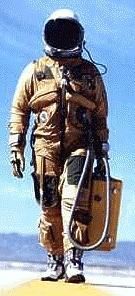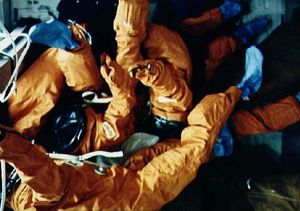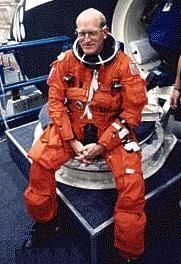
Home - Search - Browse - Alphabetic Index: 0- 1- 2- 3- 4- 5- 6- 7- 8- 9
A- B- C- D- E- F- G- H- I- J- K- L- M- N- O- P- Q- R- S- T- U- V- W- X- Y- Z
Shuttle LES
 S1032 Suit Credit: Dave Clark |
AKA: S1032. Status: operational 1986. Gross mass: 11 kg (24 lb).
The Shuttle launch/entry suit (LES) was a partial-pressure suit designed to protect shuttle crew in the event of loss of cabin pressure at altitudes up to 30 km. It also served to insulate the crew from cold air or water temperatures after a bail out from the shuttle. The suit was a modified CSU-4/P with non-conformal full pressure helmet, dual neck dam, integrated exposure suit, parachute harness and flotation equipment. During re-entry, an anti-G protection system consisting of pressure bladders in the legs and lower abdomen fought pooling of blood in the lower body after prolonged exposure to microgravity. The suit also protected the crew from any contamination in the cabin atmosphere. The LES was replaced by the Shuttle ACES suit from 1995 on.
With the destruction of STS Mission 51-L on 28 January 1986, a 'fast track' program to provide astronaut high altitude protection was instituted by NASA. This resulted in the multi-layer NASA Launch/Entry Suit (designated model S1032 LES by David Clark Company), which was developed to provide combined anti-G protection, emergency pressurization, anti-exposure protection, high altitude escape, and sea-survival for shuttle orbiter crews. These partial pressure (twin-walled bladder type) suits were used with a specially integrated parachute, emergency oxygen system and survival kit pack, worn on the back in combination with the suit. Each LES garment weighed, with helmet, approximately 11 kg (excluding parachute/survival pack).
Family: Space Suits. Country: USA. Agency: NASA, David Clark. Bibliography: 490.
 | STS-26 STS-26 Commander Hauck with launch and entry suits (LESs) on OV-103's middeck Credit: NASA |
 | STS-26 STS-26 launch and entry suits (LESs) free float on OV-103's middeck Credit: NASA |
 | S1032 Suit Credit: NASA |
Back to top of page
Home - Search - Browse - Alphabetic Index: 0- 1- 2- 3- 4- 5- 6- 7- 8- 9
A- B- C- D- E- F- G- H- I- J- K- L- M- N- O- P- Q- R- S- T- U- V- W- X- Y- Z
© 1997-2019 Mark Wade - Contact
© / Conditions for Use